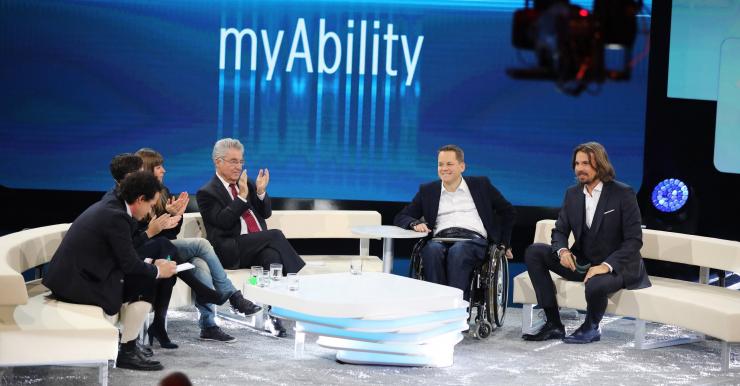A new economic approach proves that it is simply financially worthwhile for companies to recruit and attract people with disabilities as employees and customers. More than 2.5 percent of gross personnel costs can be recovered through inclusion policies in large companies. Innovation experts recognized this advance as part of the ORF campaign.
As part of the ORF campaign "ÖSTERREich kann" (“Austria/I can”) the ten most ingenious ideas were presented by a board of experts. The experts include among others Sonja Zimmermann, chair of the Berndorf Private Foundation, Matthias Reisinger, head of Impact Hub Vienna, and Christine Rhomberg, CEO of the Hilti Foundation. professionals on problem-solving, such as former ski racer and entrepreneur Rainer Schönfelder and former Federal President Heinz Fischer put Demblin's concept through its paces in front of the camera.
The objective of the campaign was finding innovative solutions to specific problems; Solutions that Austria can be proud of. myAbility earned their place with its new, economic approach for companies to deal with the issue of disability. Gregor Demblin describes, “Disability is not only a social issue, but simply pays off for companies. People with disabilities are often seen as cost centres or charitable projects. However, they are top performers who have a lot to offer employers – and, yet, they are constantly either ignored or underestimated in the job market.” Even as potential customers, they are offered insufficient or inadequate products. As a result, this can lead to significant revenue loss for companies.
Take advantage of the potential of 1.7 million people
A total of 20.5 percent of the Austrian population has a disability. These include visual and hearing impairments, limited mobility in the musculoskeletal system as well as chronic diseases. Demblin notes, "In total, there are more than 1.7 million people who are not considered as potential employees and customers." myAbility supports companies to realize financial advantages by offering accessible products and target group-oriented measures. What is meant here are not primarily built environmental modifications, but rather flexible working models and accessible recruitment. The elimination of the compensatory levy is only the most obvious financial advantage of employing people with disabilities. (It must be paid if companies do not hire one beneficiary disabled person for every 25 employees). Overall, for large companies the benefit of inclusion policies can amount to more than 2.5 percent of the gross personnel costs."For us, ‘ÖSTERREich kann’ (‘Austria/I can’) is a great thing", says Demblin. "It proves that people in Austria are beginning to understand the potential of the topic of disAbility: We benefit when we stop 'hindering' promising employees in their work performance."
Every 7th employee has a hidden disability
Demblin himself has extensive experience with this. Since the age of 18, he has been paralyzed due to an accident. “The way people treated me changed abruptly because of my disability. Even though there was absolutely no reason to do so.” Demblin decided to change leaders’ mindsets and fill in the knowledge gaps. "Employers are afraid of additional costs, of the protection against dismissal, and often don't even know where to start." However, many companies have already taken measures to ensure accessibly. But they are not aware of it. In addition to this, every 7th employee already has a hidden disability. Efforts to hide these disabilities, due to a closed-minded work culture, affects workplace efficiency and productivity negatively. myAbility proves that there is another way. A comprehensive analysis of each company identifies a series of measures to clear the way for employees and customers with disabilities and to fully exploit their potential.
